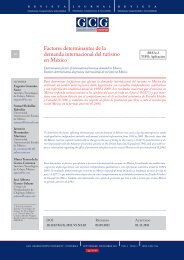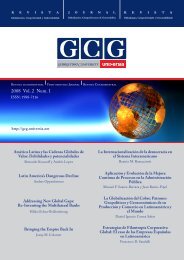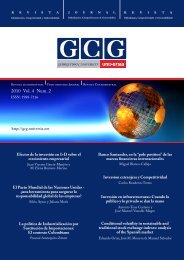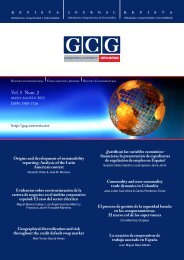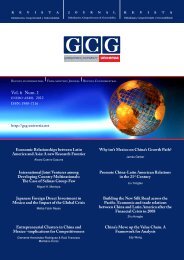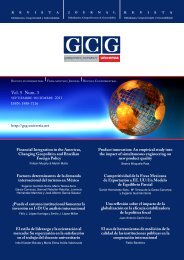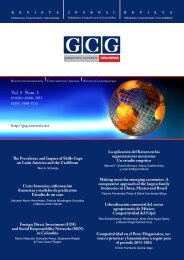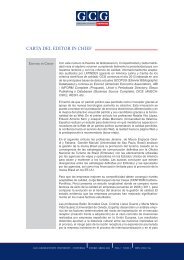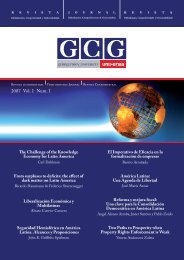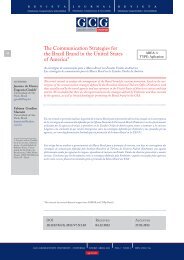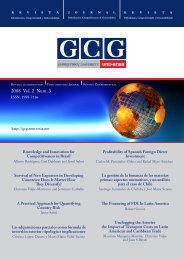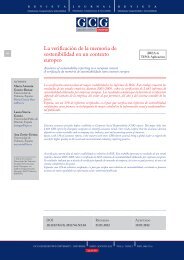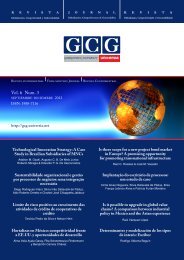2010 Vol. 4 Num. 1 - GCG: Revista de Globalización, Competitividad ...
2010 Vol. 4 Num. 1 - GCG: Revista de Globalización, Competitividad ...
2010 Vol. 4 Num. 1 - GCG: Revista de Globalización, Competitividad ...
Create successful ePaper yourself
Turn your PDF publications into a flip-book with our unique Google optimized e-Paper software.
Experiencias Internacionales para fortalecer la gobernabilidad<br />
24 Lo que es particularmente inquietante es el alto nivel <strong>de</strong> corrupción asociado con las industrias<br />
basadas en materias primas – el cimiento económico <strong>de</strong> muchos países en <strong>de</strong>sarrollo<br />
(Leite y Wei<strong>de</strong>mann, 1999). Véase por ejemplo el caso <strong>de</strong>l petróleo, don<strong>de</strong> países como<br />
Nigeria, Indonesia, Algeria y México exportan entre 2 mil y 35 mil millones <strong>de</strong> dólares, <strong>de</strong>pendiendo<br />
<strong>de</strong>l volumen <strong>de</strong> producción y el precio <strong>de</strong>l petróleo (y aún mayores con los precios<br />
actuales) - sin embargo, sus <strong>de</strong>sempeños en términos <strong>de</strong> crecimiento económico son<br />
significativamente más bajos que en países en el mismo nivel <strong>de</strong> ingreso per capita. ¿Dón<strong>de</strong><br />
han ido a parar los recursos cuando los resultados económicos son tan efímeros?<br />
No <strong>de</strong>biera, por ello, sorpren<strong>de</strong>r que los países que <strong>de</strong>pen<strong>de</strong>n <strong>de</strong> industrias extractivas<br />
tiendan a estar ubicados en los percentiles inferiores <strong>de</strong> evaluación <strong>de</strong> gobernancia, don<strong>de</strong><br />
la corrupción tien<strong>de</strong> a ser alta:<br />
3<br />
2<br />
Normalized Rule of Law In<strong>de</strong>x<br />
1<br />
0<br />
-1<br />
-2<br />
Congo, Dem. Rep.<br />
IRAQ<br />
HIGH<br />
GUINEA<br />
VENEZUELA<br />
NIGERIA<br />
CHAD<br />
ANGOLA<br />
LOW<br />
CONGO<br />
SIERRA LEONE<br />
TAJIKISTAN<br />
TOGO<br />
CAMEROON<br />
ECUADOR<br />
PAPUA NEW GUINEA<br />
BOLIVIA<br />
NIGER<br />
INDONESIA<br />
IRAN<br />
AZERBAIJAN<br />
KAZAKHSTAN<br />
ZAMBIA<br />
Rule of Law - 2006<br />
GABON<br />
MOZAMBIQUE<br />
Correlación O minosa<br />
Gobernabilidad en Países<br />
con I ndustrias E xtractivas (2006)<br />
(Chosen comparator also shown for selected countries)<br />
SOUTH AFRICA<br />
211 Countries<br />
BOTSWANA<br />
CHILE<br />
NORWAY<br />
Note: Blue dots represent estimates<br />
for the 2006 governance indicators.<br />
The thin vertical lines represent<br />
standard errors around these<br />
estimates for each country in worldwi<strong>de</strong><br />
sample. Black dot represents the<br />
chosen year comparator (if any). To<br />
add or <strong>de</strong>lete countries from the chart,<br />
click on the "Country Selection" tab<br />
below.<br />
-3<br />
Source: "Governance Matters VI: Governance Indicators for 1996-2006 " by Daniel Kaufmann, Aart Kraay and Massimo Mastruzzi.<br />
Disclaimer: The governance indicators presented here reflect the statistical compilation of responses on the quality of governance given by a large<br />
number of enterprise, citizen and expert survey respon<strong>de</strong>nts in industrial and <strong>de</strong>veloping countries, as reported by a number of survey institutes,<br />
think tanks, non-governmental organizations, and international organizations. The aggregate indicators in no way reflect the official position of the<br />
90th – World 100th Bank, percentile its Executive 75th Directors, – 90th or percentile the countries 50th they represent. – 75th percentile As discussed 25th in <strong>de</strong>tail -50th in the percentile accompanying 10th papers, – 25th countries' percentile relative positions 0th – 10th percentile<br />
on these indicators are subject to margins of error that are clearly indicated. Consequently, precise country rankings should not be inferred from this<br />
Pero los efectos más allá <strong>de</strong>l impacto en los países productores <strong>de</strong> industrias extractivas,<br />
especialmente aquellas integradas verticalmente como los hidrocarburos. Sus impactos<br />
pue<strong>de</strong>n ser igualmente <strong>de</strong>vastadores aunque más extensos. Productos <strong>de</strong> petróleo <strong>de</strong>sempeñan<br />
un papel esencial en el <strong>de</strong>sarrollo económico en las etapas primarias <strong>de</strong> crecimiento<br />
–en especial en África Subsahariana (Schloss, 2003; Schloss, 1993). La adquisición <strong>de</strong><br />
hidrocarburos absorbe entre 20 y 35 por ciento <strong>de</strong> niveles <strong>de</strong> exportación en la mayoría <strong>de</strong><br />
los países <strong>de</strong> la región y genera aproximadamente 40 por ciento <strong>de</strong> los ingresos tributarios<br />
–constituyendo así el mayor ítem en la balanza <strong>de</strong> pago e ingresos fiscales en la mayoría<br />
<strong>GCG</strong> GEORGETOWN UNIVERSITY - UNIVERSIA <strong>2010</strong> VOL. 4 NUM. 1 ISSN: 1988-7116



